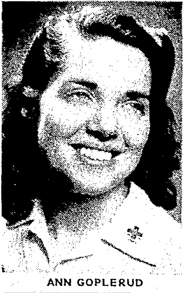TWO TEACHERS TO AID WAR
Leaves of absence were extended to two teachers last night at a meeting of the Ames school board—Miss Ann Goplerud, teacher at Central junior high school, and Miss Ada Versteeg of Welch school. Miss Goplerud, music instructor, will leave at the end of the semester to begin overseas duty with a mobile unit of the American Red Cross, and Miss Versteeg, who is teaching English and Latin here, has just been inducted into the WAAC’s.
Miss Evelyn Fahan Molln will succeed Miss Goplerud as vocal music instructor. Greco will take Miss Versteeg’s place.
Source: Ames Tribune, January 12, 1943
![]()
FORMER AMES TEACHER NOW IN AFRICA
Miss Ann Goplerud, former Ames music teacher, is “having the time of her life” in North Africa, she writes to her parents, Mr. and Mrs. Clifford Goplerud of Osage.
Miss Goplerud left Ames about the end of January to join an American Red Cross service unit for overseas duty, and is now stationed in a Red Cross service club in Africa. She is a graduate of Grinnell College, and was music instructor at Belmond before coming here.
Two letters which her parents received last week were the first word which they had had from her since she left New York. She left in a convoy which was taken part of the way by plane.
There are three units in the Red Cross service club where she is located. Miss Goplerud writes—one for Negroes, one for men of the Allied nations, and one for enlisted men and marines. She is with the third group. The building is very large, she reports, housing all types of amusement for the boys.
She says the boys love to hear recorded music at the service club and are hungry for the entertainment provided and grateful to the Red Cross for providing the building and the service unit.
Source: Ames Tribune, April 17, 1943
![]()
Osage Girl, Famous Overseas as “Ann of Iowa,” Has Permanent Spot in GI Hearts
~Written by Patty Johnson, Women’s Page Editor
They call her “Ann of Iowa” and your sons and husbands knew her smiling face and heard the echoes of her clear, sweet voice across the sands of North Africa and beachheads of southern France.
She’s Ann Goplerud of Osage, Ia, a 27-year-old girl who joined the Red Cross and went overseas for 32 months of taking it on the chin with GIs just because she “wanted to do something to help.”
Somehow in Casablanca somebody discovered that Ann could do more to build morale with a sentimental song than all her work at the Red Cross Club and so her pilgrimage from hospital to foxhole, from Africa to Italy to France, began.
Songs In Spare Time
“I started singing in my spare time,” says Ann, daughter of Mr. and Mrs. C. P. Goplerud of Osage, “and the Red Cross began to give me time away from the club. Finally they just told me to come to the club, when I wasn’t singing.”
And the GIs in the hospitals hailed her with delight—but sent her on to their buddies at the front. At the front, the boys listened with tears in their eyes—but sent her back to their buddies in the hospitals because they needed her, too. There are thousands, even millions of soldiers, who know Ann because she knew and loved them all.
Her voice was heard in the enlisted men’s club at Naples, then all over Italy, at Anzio and in Rome. She followed the invasion into France. She sang for the GIs in Alsace-Lorraine and she went on to Austria, Germany, Belgium and Luxembourg.
In many places she was the first American girl and she was every soldier’s sister, sweetheart and mother. She has thousands of letters, she guesses, from lonely, frightened, homesick boys and there are thousands of letters back home written by Ann to tell the family that Joe or Pete or Bud is okay—or dead.
Because she gave so much of herself, her fame spread from foxhole to foxhole. There is even an article about her in the December American magazine written by a GI she never met and who never even learned her last name.
All Her Friends
“Hardly anybody knew it,” she says. “I tried to be a sister to them all. But I didn’t know a thing about the article until I came home. They were all my friends.”
It was hard for an Iowa girl, a music teacher at Ames, Ia., and a member of the hometown church choir, to accustom herself to bombings, air raids, and the high whine of bullets.
“You never really get used to it,” she says. “And you never get used to death. There were so many tragic cases. I’d sing for the boys one day and the next I’d find them in the hospital. Sometimes I didn’t even recognize them, they were hurt so badly.”
“ ‘Why, Ann,’ they’d say, ‘Don’t you remember me?’ And sometimes, ‘Bye, Ann, see you soon.’ –and then I’d hear they were dead.”
Ann of Iowa is a smooth-haired girl with a shy blush, a quivery dimple when she smiles and a heart packed with love for the infantryman—and one in particular, although she is reticent about romance.
You wouldn’t guess until you talked to her and heard her sing favorite GI songs like, “I’m Gonna Love That Guy,” “I’ll Walk Alone,” and “Occupation Blues,” that she has a voice loaded with appeal and that she has a personality meant to shoulder the troubles of every guy with a longing for home.
“You know all about their families. They tell you all their problems,” says Ann of Iowa. “You discover that strikes make the soldiers furious and that people at home can’t every really understand what they go through.”
Want To Come Home
“Everything is so awful for them, but they take it so beautifully that you learn to take it that way, too. The infantrymen lost hope that the war would ever end and now that it has, all they want is just to come home again.”
“They are afraid people will forget them when they finally get here. I don’t see how anybody could—ever!”
The GIs haven’t forgotten Ann. They find her even now. She was in Waterloo last week for a bond meeting and they discovered her there. She’ll be leaving soon on a three-month tour of the United States to raise funds for the Red Cross and they’ll come up to beg her to sing for them again as she did not so long ago in the mud and rain and dust of Italy and France.
You can forget about your history book heroines. There’s a voice that still rings in the hearts of millions of GIs everywhere. It belongs to Ann of Iowa and she belongs to them.
~Unknown newspaper source, but likely the Des Moines Register dated just after the end of WWII. [1945]
![]()
—A quote from my Dad, then young, single soldier, age 20. My Dad was a U.S. Army foot soldier, Vernon C. Ewin from LeMars, Iowa. ~quote added by Linda Ewin Ziemann
Dad wrote in his memoirs and I quote:
I was in surgery again for my wounds on Christmas day of 1944, in a Paris, France hospital. During my stay in the Paris hospital, a USO lady came by to visit with me. She was a singer and a good one. On New Year’s Eve she came over to my bed and said, “I hear you are from Iowa.” This lady was known as Ann of Iowa. She asked, “Do you have a girlfriend?” I said, “Yes.” She continued, “What is her name?” I replied, “Irene.” She sat there at my bedside and sang for me, “Good Night, Irene.” Needless to say, tears came to my eyes!
![]()
FRONTLINES SINGER 32 MONTHS
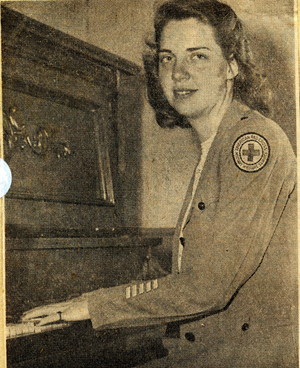
“A top entertainment figure of World War II, Ann of Iowa still typifies the girl fighting Yanks dreamed about in foxholes. She is Ann Goplerud, of Osage, who spent 32 months as a frontlines singer with the American Red Cross.”
Ann of Iowa Who Sang at Front, Home
By Lulu Mae Coe (Register Staff Writer)
OSAGE, IA.—The girl the Yanks named “Ann of Iowa” is home again.
She is Ann Goplerud, who warbled in the high school chorus and taught school before she became the first front lines entertainer for the Red Cross.
To infantrymen from Africa to Germany, Ann was a “swell singer and a swell girl,” but she has made almost as amazing an Iowa record.
Heroine.
She managed to be a heroine to former pupils.
Tuesday she visited their school rooms at Ames, Ia., where she taught music in the junior high school.
The youngsters have seen many heroes lately, but to have had a teacher who had sung “White Christmas” against the roar of guns was something!
They were thrilled clear to their toes when Ann sang for them as she had sung for a million men overseas.
The pupils asked questions and Ann answered, telling about the grandest fellows in the world, “American soldiers,” Christmas day at a forward observation post, and the silver service bars on her uniform.
Talks Slated.
During the remainder of her leave, she will talk at Victory loan rallies, clubs, lodge, and Parent-Teacher association meetings, and schools.
Never afraid overseas, Ann confesses she is afraid most of the time now. “I’m scared to death to talk to an audience,” she explained. “Overseas, I just sang.”
However, she is conquering her fear, so that she can tell Iowans of the courage, strength, and valor of all the service men, and of infantrymen in particular.
This week Ann is scheduled to speak at a veteran’s dinner and a school convocation in Osage and at a Mason City, Ia., rally.
Won Yank’s Hearts.
Although Ann has been home only a few days, she has talked at a Waterloo, Ia., bond rally and for the Order of the Eastern Star and another school convocation here.
The Red Cross singer is an A-1 exhibit here, both when she appears before an audience and when she goes down the street to the grocery store. The town enjoys having a celebrity and Ann loves to chat with the people she has known since babyhood.
Ann, daughter of Mitchell County Engineer Clifford Goplerud and Mrs. Goplerud, is featured in the December issue of the American magazine.
“Girl Named Ann.”
The article in the American was written by Sgt. Frank Brookhouser—one of her admirers who knew the singer only as “a girl named Ann.” Ann incidentally doesn’t even recall the sergeant, who recommends that she be given a medal.
“She was the girl back home,” Sergeant Brookhouser recalls, “Only she was over here—with us. And she was pretty. Not beautiful, but nice, with friendly blue eyes, a firm, slightly up-turned nose, a full round mouth, a trim agile-looking figure, the snapshot in the wallet come to life.”
What won the soldier’s hearts was the fact that Ann took her songs to the fighting men. Her stage usually was a cobble-stoned street in a bombed village, a rutted field not so far behind the front lines, or a barn complete with cows.
Six or a hundred men might make up the G. I. audience. They might be waiting to go into combat. Or, after leaving the front lines, they often stopped to listen longingly to her soft contralto singing of “Long Ago and Far Away.”
Ann sang a dozen hours daily. A program for a division coming off the lines began at 1 a.m. and the men wanted more music when she stopped. Yet her voice remains clear and fresh.
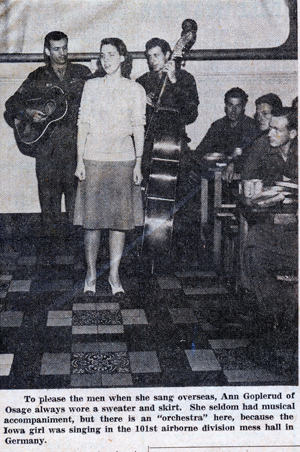
Wore Sweaters, Skirts.
Because the men did not like entertainers in uniform, Ann wore sweaters, skirts, saddle shoes or spectator pumps. That was her costume even in the cold of the Italian hills and of Alsace-Lorraine.
The unfeminine part of Ann’s wardrobe was a pair of knee high rubber boots. Many a G. I. can tell of pulling Ann—then her rubber boots—out of sticky French and Italian mud.
Many Detours.
Red Cross field directors, army special services officers, and hospital administrators arranged her complex schedule. Even then, Ann made many a small detour to sing for men in lonely isolated outposts.
Many of the never heard the “Goplerud” part of her name. She was just Ann from Iowa—the symbolical girl from home.
Men in forward positions were amazed to see a young girl, with blue eyes, a dimple and a repertoire of a thousand songs. Except in rest camps, she generally sang unaccompanied.
Tired, lonely, unshaven men got a lift from hearing Ann sing their favorite song: “I’ll Walk Alone.”
Boogie Woogie.
Of course, men asked for boogie woogie as well as ballads. “Cow Cow Boogie” and “Pig Foot Pete” were two favorites.
In March, 1943, Ann went to Casablanca as a Red Cross staff assistant. When the men heard her songs, they urged her to sing for their outfit in the field or at a hospital.
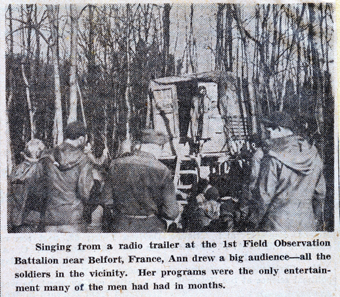
Soon the only permanent thing in her life was a mail address.
She sang for reserve battalions waiting between the foxholes and the forward gun positions to go into action. Many a gun crew left for a mission in the middle of a concert and returned for the final few minutes of music.
Ann sang in every hospital on her route from Africa through Italy, France, Belgium, Germany, and Austria. The rest camps were the most fun, because the men were cheerful. They tapped their feet to the rhythm of Ann’s playing and harmonized on “My Wild Irish Rose.”
Standing on an LCI (landing craft infantry) Ann sang, “I’ll Be Seeing You,” as three divisions left Italy for the invasion of France. She meant it, too. She went to France as soon as authorities granted permission.
Staging Area.
Ann was asked to sing at the Le Havre, France, staging area when high point men of divisions she had known all through Europe were sailing for home. She recalls the occasion with deep sentiment.
“I had seen them leave so many times, in so many places,” she said. “This was the first time I had seen them leave for a place that was good.”
Ann could cover a division of 15,000 men in five days, singing for them in small groups of 100 or so. She remained as many as five days at a large general hospital. She always went from bed to bed, singing the soft, sentimental songs the men requested, talking with them in her gentle, quiet way.
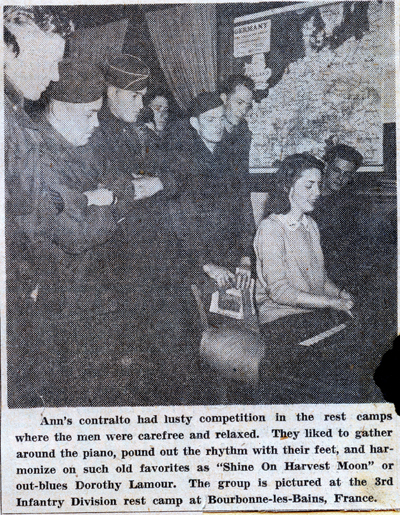
Varied Transport.
The Iowa girl made her rounds in trucks, jeeps, and ambulances. She was flown into France in an L-5, which made an emergency landing in a blizzard.
Men at Anzio requested her as an entertainer, after her broadcasts from Naples, Italy. Since authorities refused to permit women in that area, the men had to be content to tune in on her programs with their foxhole “razor blade” sets.
Holiday Cheer.
Last Christmas, Ann visited forward observation posts near Mulhouse, France. An American field artillery brigade supporting French infantry had become the “forgotten unit” of the army, and she was asked to provide some holiday cheer. Shell fire had killed men just before her arrival.
The Red Cross worker insists danger was potential rather than actual. Although she had been under fire at Cassino and at several French points, men were not assembled for entertainment in a very active sector.
Nevertheless, Ann generally used the field communications to sing “Star Dust” to the men at the forward observation posts.
Unaffected.
Ann is unaffected, natural, and emotional only about all the men who slogged through the mud of the European theater.
She never will be a pinup girl, but thousands of men will cherish her memory when the bathing beauty picture is a part of the dust of France. A lot of soldiers think Ann of Iowa should have the combat infantryman’s decoration.
Ann is somewhat changed, however. She does not want to go back to teaching. And she enjoyed teaching at Belmond, Ia., and at Ames, following graduation from Grinnell College at Grinnell, Ia.
“Teaching now seems so far away and remote,” she said. “I guess I have seen too much to settle down to teaching again.”
Broadcasts.
Her choice of job is as a Red Cross entertainer in veteran’s hospitals. If that is not possible, she would like a radio program.
After her return to New York, N. Y., from overseas, she made several broadcasts. Those, coupled with her overseas programs, have given her a taste “for the air,” as she said.
First, however, Ann will make a three-month tour for the Red Cross fund drive, beginning in January.
Source: The Des Moines Register (unknown date of publication)
![]()
OSAGE GIRL GI'S 'ALL-AMERICAN'
Ann Goplerud Chosen Favorite by Soldiers
Friends here have received a copy of a recent issue of the Stars and Stripes American newspaper published for the fighting men on the western front, containing an article concerning Miss Ann Goplerud of Osage described as the "soldiers All-American Girl."
Miss Goelrud is a daughter of Mr. and Mrs. Clifford Goplerud of Osage. She is a singer and entertainer and has been in Red Cross work since February, 1943. A month later she went overseas where she thought she could do most good.
The article, written by Cpl. Charles McCleary, states "She is a girl who feel there is no sacrifice too great help the solider --and she backs it with action regardless of difficulties. She is the kind of girl that all doughboys feel they can talk to, but never without the greatest of respect."
She has been with the infantry in Africa, Italy, and now in France.
Thousands of soldiers who have met Ann describe her as one of the sweetest singers they have heard and one of the outstanding personalities they ever hope to meet.
Ann was graduated from Grinnell college in 1940.
Source: The Mason City Globe-Gazette, March 12, 1945
![]()
FINDS GERMAN GIRLS NORMAL
Red Cross Worker Says They’re Clean, Natural
Osage—Ann Goplerud, who served 32 months in the African and European war theaters as a Red Cross staff assistant and has now returned to her home here, says she found German girls are just like American girls.
“They spoke English fluently, were intelligent, normal, healthy,” she said. “You can’t blame a homesick GI for fraternizing with the German girls. I don’t approve, but I can see where, after seeing the disheveled average French girl with her painted face and dyed hair, as well as the Italians, the Americans would like the clean, natural German girls.”
“The adult Germans do not approve, however. One woman said to me, ‘I can’t see how our girls can do this when they know what they owe our own men.’ “
Referring to the German men, Ann said: “I’ve never seen a group of men so battle scarred, so wary looking or having so many amputations as the Germans. It is dreadful. Food they did not lack, for they stole from Europe. A little starving won’t do them any harm now, but the devastation of the country, the condition of the average German man is deplorable.”
After telling of the horrors which she went through in Africa, Italy, France, Luxembourg, Belgium, Germany and Austria, she was asked if she would care to go through her experiences again.
She replied: “Yes, a thousand times yes. I wouldn’t take anything for the wonderful experiences I have had. I’ve learned, I think, what is really important in life. The things I had once thought were so important, I’ve learned just don’t matter any more. Friendships are the only real things that matter in life. If America could only know how grand America is.”
Source: Mason City Globe-Gazette, December 1, 1945
![]()
More Details About Ann
-1-
Goplerud, Ann
American Red Cross (mobile unit)
Mr. & Mrs. Clifford Goplerud, Osage (Parents)
Former Ames teacher
Honorable discharge 1/14/46
-2-
Goplerud, Ann
2/43 - Entered service
4/43 – Red Cross Service Club – North Africa
3/44 – Naples, Italy
7/45 – Germany
Honorable discharge 1/14/46
![]()
Ann's Obituary
ANN GOPLERUD KENNEDY
OSAGE, IOWA - Ann Goplerud Kennedy, 81, of Washington, D.C., formerly of Osage, died Oct. 12, 1999 at Palmerton, Pa.
Graveside memorial services will be held at 1 p.m. Thursday at the Osage Cemetery, with the Rev. Arthur Hill officiating.
Champion Funeral Home, Osage, is in charge of arrangements.
The family suggests memorials be directed to the Osage Public Library.
Survivors include one sister, Dr. Jane Goplerud, of Palmerton, Pa.; two brothers, Harald "Bud" Goplerud and his wife, June, of Mason City and Dr. C. Peter Goplerud and his wife, Eileen, of Iowa City; and many nieces and nephews.
Source: Mason City Globe Gazette, Oct. 19, 1999
![]()
